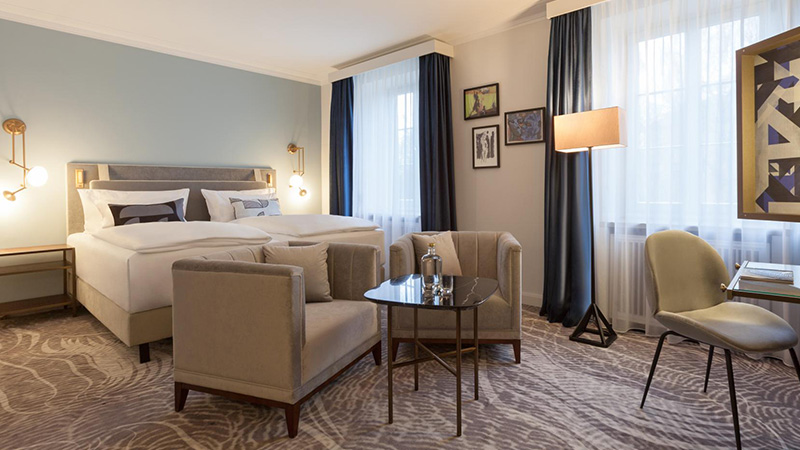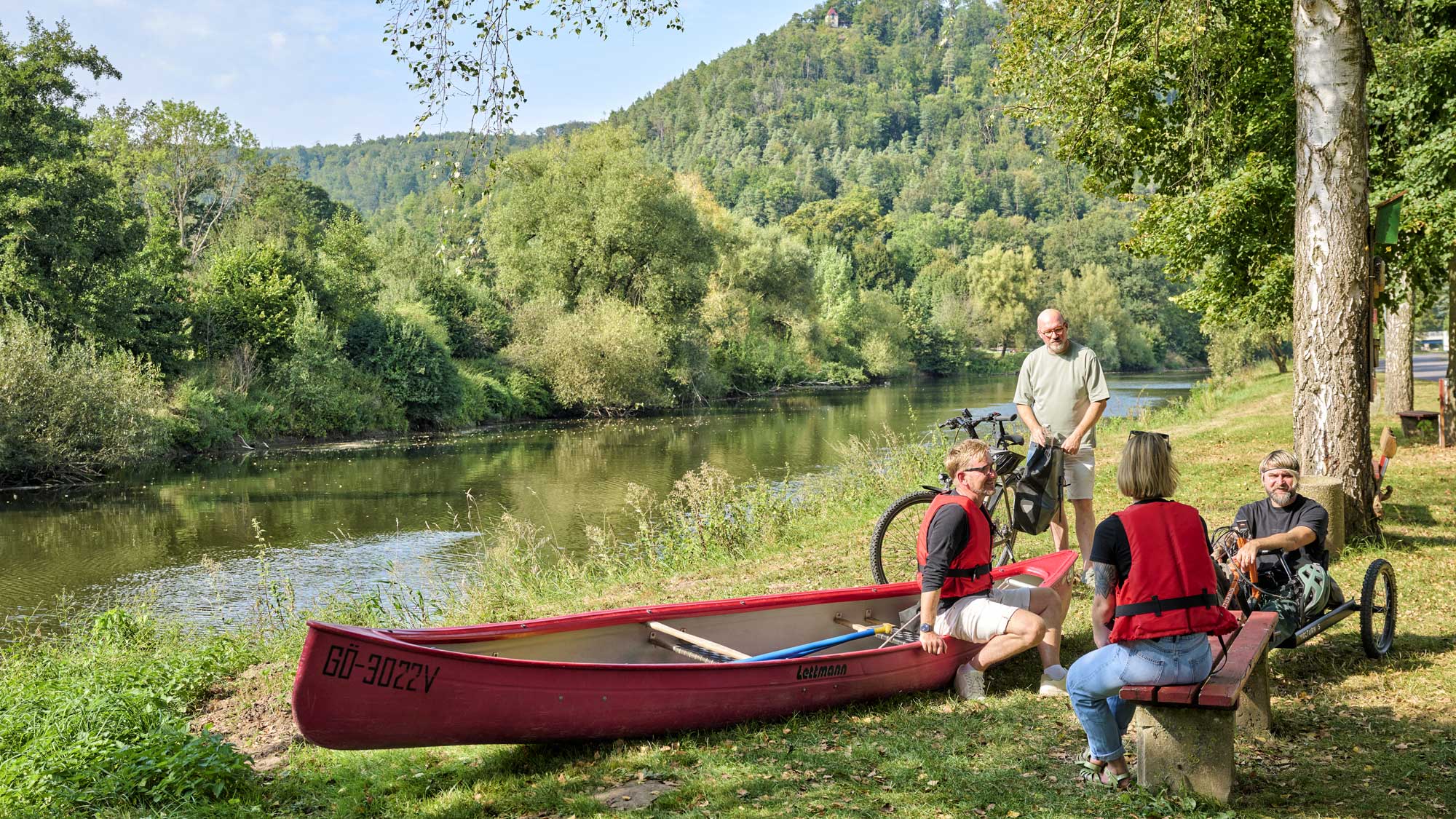You're in the right place! Whether in nature, in the middle of the city, for families, in the countryside, historic or traditional: among Thuringia's TOP hosts, everyone will find exactly the right address.
Seven towns, seven days of cycling, music and culture
Thuringia Cycle Route
Eisenach is the starting point on this cycling tour, which takes about a week from start to finish. The town lies on the edge of the Thuringian Forest and has a charming old quarter. Eisenach’s most famous son is the great composer Johann Sebastian Bach. Bach’s House in Eisenach is one of Germany’s largest museums dedicated to a musician.
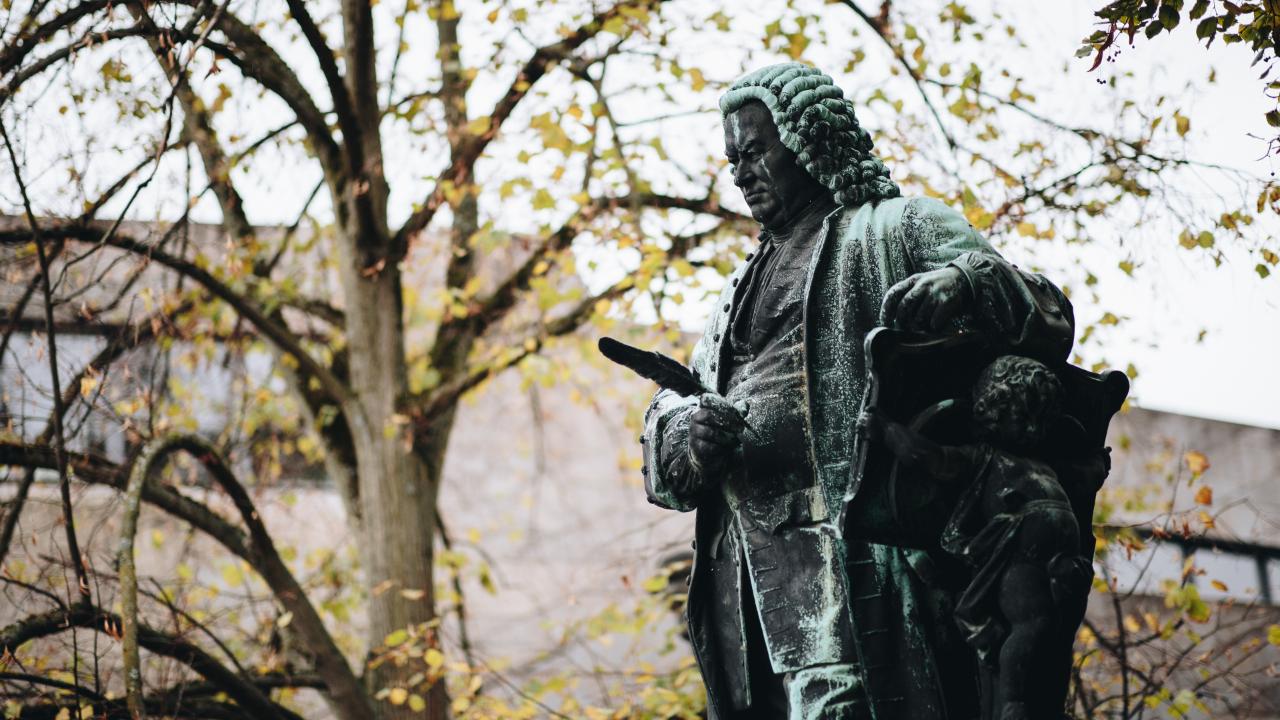
Bach Memorial in Eisenach ©Robert Wachholz, weimar GmbH
Eisenach – Wartburg Castle or the theatre
If you arrive early enough the day before, you might like to visit the famous Wartburg Castle or make a stop at Bach’s House in Eisenach, where live concerts are played on historical instruments every hour. Alternatively, you could plan a whole evening of cultural entertainment by checking the programme of the Eisenach State Theatre before you go. The theatre, housed in a neoclassical building from 1879, presents plays, symphony concerts, music theatre, puppetry and ballet evenings, as well as children’s and youth theatre.
On the trail of the Bach family
Bach Discovery Route
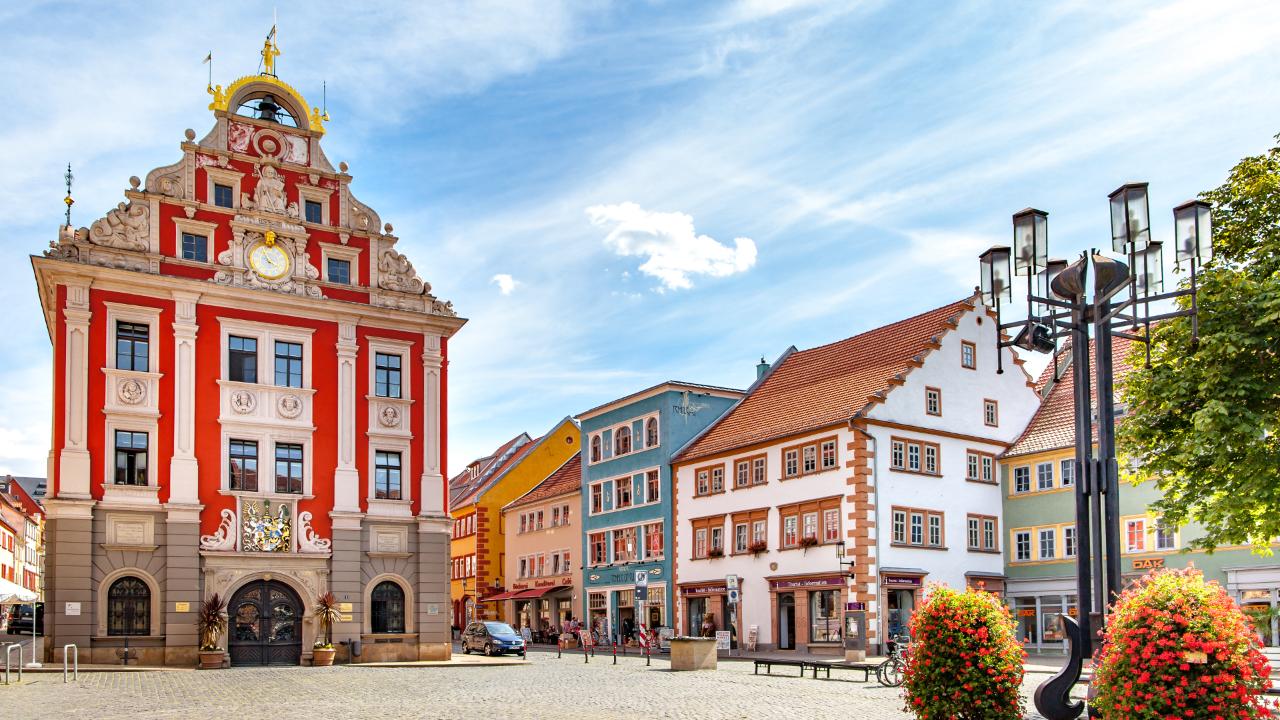
Town hall in Gotha ©Daniel James Clarke, Cultural Heart of Germany
Gotha and the music of the Thuringian Philharmonic Orchestra
Stopping off in Gotha: The baroque universe of Friedenstein Palace is a remarkable experience. It includes the Ekhof Theatre, the world’s oldest baroque theatre with original stage machinery, a very special place to visit. The manually operated sets are still used during the Ekhof Festival in the summer, when the theatre puts on plays from the 15th to 18th centuries.
The Thuringian Philharmonic Orchestra Gotha-Eisenach was established in 2017 and presents an ambitious programme of concerts at both locations. While in Gotha, it is also well worth stopping off at the beautiful market square with its cafés and restaurants. You will usually find a mobile food stall there selling Thuringian bratwurst sausages.
Erfurt – plenty to see and do in the state capital
It almost seems a shame to only be paying a flying visit when you could easily spend a week seeing the cultural sights in the state capital. Erfurt has many original sites associated with Martin Luther as well as one of Germany’s most beautiful old quarters, which includes the famous Merchants’ Bridge. It is also a popular festival location and home to many cultural attractions. One of them is quite modern – from the outside at least: Erfurt Theatre was built in 2003 and also organises the Cathedral Steps Theatre Festival. During the festival, the 70 steps between the cathedral and St. Severus Church are transformed into a spectacular open-air stage for theatre, opera, concerts, ballets and musicals.
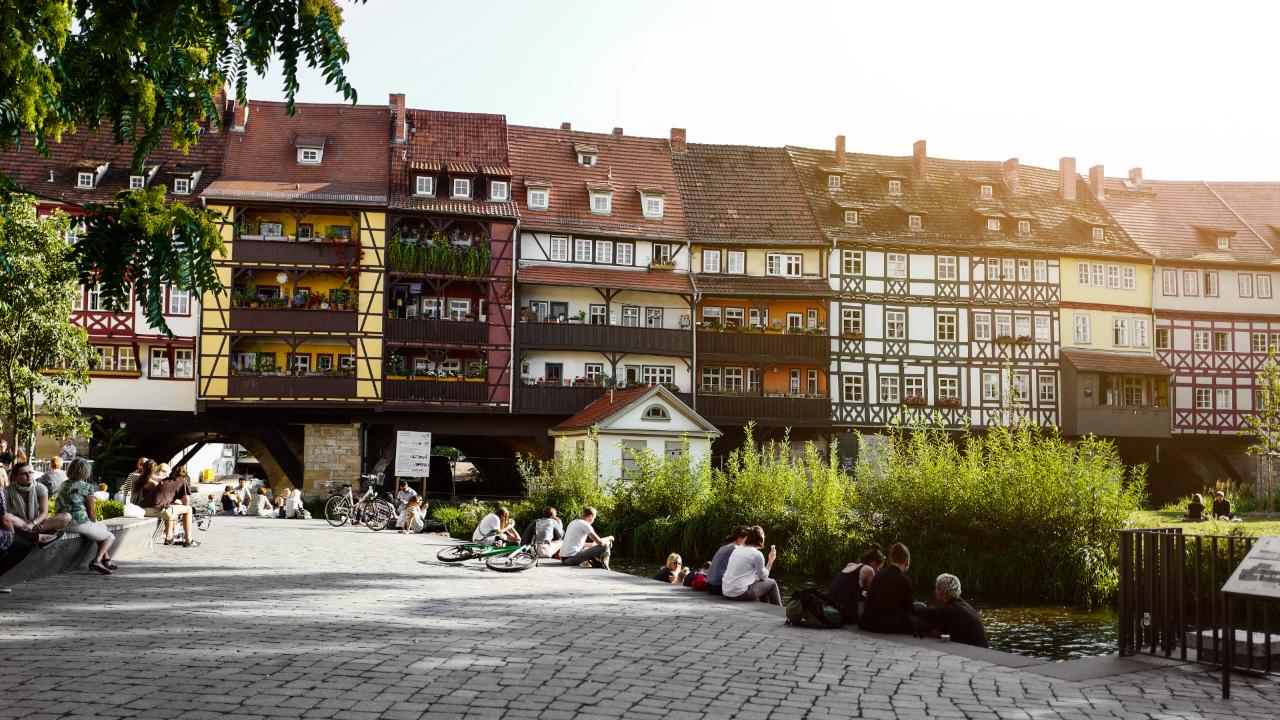
Merchants’ Bridge in Erfurt ©Marco Fischer, Thüringer Tourismus GmbH
Soaking up the atmosphere in Erfurt: the charming old quarter is a maze of narrow lanes full of picturesque half-timbered buildings. At the heart of it all is the delightful Merchants’ Bridge, which is lined with little stores and artisans’ workshops where you can browse to your heart’s content. It is also a popular place for street musicians, especially during the Fête de la Musique.
Weimar – culture at every turn
The route continues to Weimar: a UNESCO-World Heritage town of poets and philosophers – Goethe, Schiller, Herder and Bach. Weimar was home to many great thinkers and is still a centre for art and culture today. Weimar is also the location of the LISZT SCHOOL of Music, whose students regularly perform concerts.
The little lanes in the old quarter of Weimar are a real treasure trove for lovers of art, history and literature. The great German poets Friedrich Schiller and Johann Wolfgang von Goethe were both residents of this town on the river Ilm. The Bauhaus was also founded in Weimar. On Theaterplatz square, you will find the House of the Weimar Republic as well as the German National Theatre – one of Germany’s leading cultural venues and home to the Staatskapelle Weimar orchestra, which is acclaimed around the world.
Jena – concerts in special locations
Jena: this buzzing university city on the middle reaches of the river Saale combines fascinating history, science and innovation with a vibrant student scene. At the Zeiss Planetarium – the world’s oldest working planetarium – you can sit back and enjoy concerts and more beneath a 360-degree dome.
The Jena Philharmonic Orchestra has played an integral part in the cultural life of this city of science for more than 80 years – but you have to time your visit well, as the musicians are often on tour. To make the concert experience all the more memorable for its audiences, the orchestra performs concert series at unusual locations around the city, such as the Volksbad, once a public baths, and TRAFO, a former electricity substation. Jena is a vibrant university city with little lanes full of charming pubs, where you can relax and unwind, with or without music, at the end of a day’s cycling.
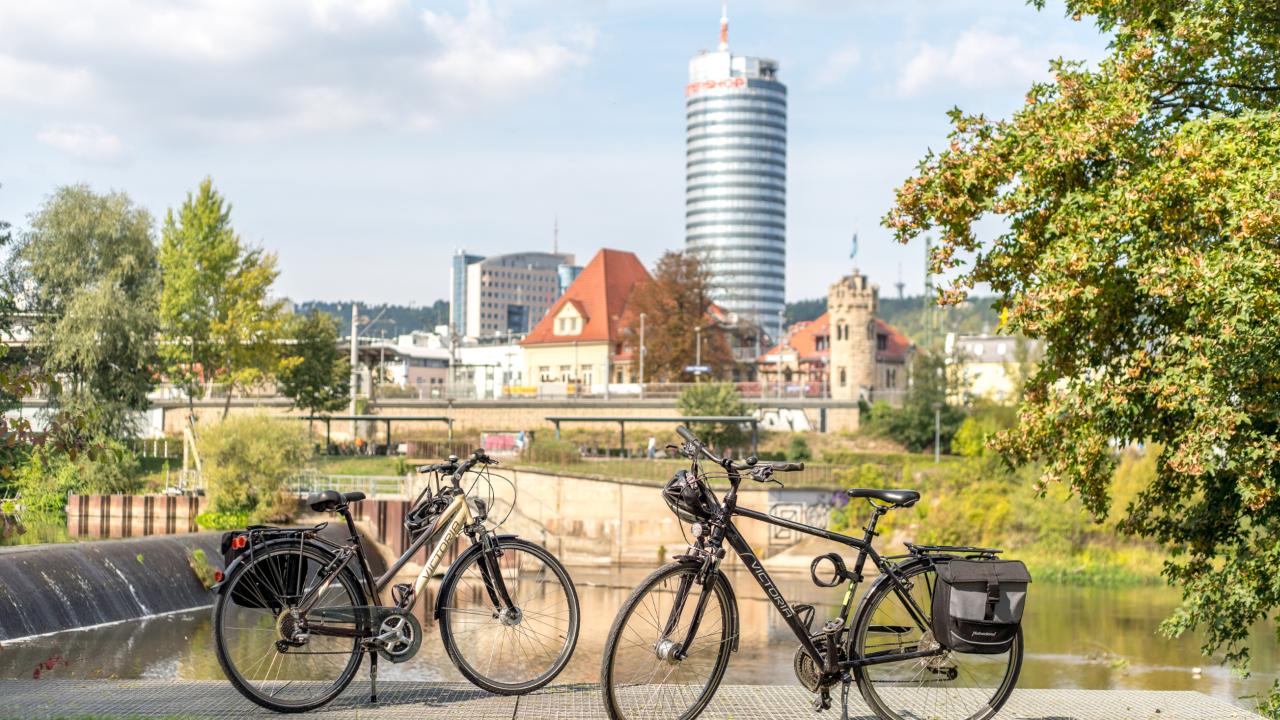
Jena ©Moritz Kertzscher, Thüringer Tourismus GmbH
Theatre takes centre stage in Gera
Almost there: Gera became famous as the birthplace of painter and artist Otto Dix. The town is set amid beautiful hills on the banks of the White Elster river. Altenburg Gera Theatre is the only venue in Thuringia to stage its own theatre, concerts, music theatre, puppetry and ballet performances.
Altenburg Gera Theatre, which also includes the Philharmonic Orchestra, attracts around 140,000 people every year. The theatre is housed in a beautifully renovated building dating from the early 20th century. Covering five different genres of performing arts, its visitor numbers are among the highest in Thuringia. Other fascinating attractions in Gera include Haus Schulenburg, a villa designed by Henry van de Velde, a pioneer of the Bauhaus movement, and Gera Caves, a system of subterranean caverns once used for storing beer.
Altenburg – concerts at the Church of the Brethren
Finally arriving at our destination: the former royal seat of Altenburg is a fascinating place to visit, with its lovingly restored town centre and impressive palace, where the annual festival to commemorate the royal kidnapping of 1455, staged by the Altenburg Gera Theatre, has become a popular attraction. The grand Residence Palace is perched on a hill overlooking the beautiful little town of Altenburg, which is the final stop on our route. It is well worth a visit, as is the fascinating Church of the Brethren, a neo-Gothic building with art nouveau features that was built in the early 20th century. The church is also the main venue for concerts performed in Altenburg by the town’s leading orchestra, the Altenburg Gera Philharmonic.
The Towns of Thuringia
Cycle Route
©Lutz Edelhoff, Theater Erfurt
Did you like this story?
Maybe, you'll like this too ...











